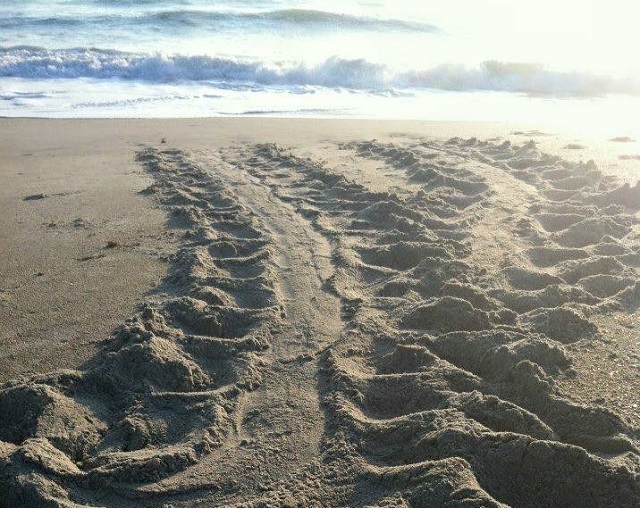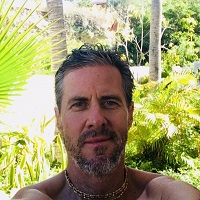Some people follow the teachings of the Buddha.
I follow the teachings of the ocean.
The waves are my spiritual texts, my instruction. My guru is the poetry of tides. The eternal, vast, deep blue home is my teacher.
If not in the ocean, then put me next to it. Oceanic poetry is alive. It is the beating heart of life hidden from our view, the synthesis of a wave, the essence buried in the sand under our feet, lying dormant.
If we hadn’t seen the female Olive Ridley sea turtle laboriously crawling back to the sea at sunrise, we wouldn’t have known that she buried her eggs in the sand. The trail she left from the sea and then back again was very distinctive—a trail with two winged shovel marks from her legs on the opposites sides of what looks like a heavy bag dragged through the sand.
It is thought by many Buddhists that Padmasambhava, the 8th-century Indian saint who brought Buddhism to Tibet, also hid spiritual teachings, called termas, in caves, forests, and lakes to be found by realized adepts at particular times in history when they would be most needed.
He concealed these secret teachings in knowledge time capsules of sort, to later be fortuitously uncovered at just the right moment to help humanity.
I wondered if the buried sea turtle nests on our beaches were trying to tell us something? Perhaps.
The oceans are being dangerously over-fished, entire ecosystems are collapsing, and countless species are going extinct.
Marine Biologist Dr. Sylvia Earle said:
“We need to convey a sense of urgency because the world is changing quickly. The next ten years for the ocean is likely to be the most important time in the next 10,000 years. We have options that we are going to lose within ten years unless we take action now. Every day, options close. Take care of the ocean as if your life depends on it, because it does.”
Earle is the real deal, and practices what she preaches. She, along with many others, are choosing a vegan diet to align with their values of conservation. The alarms bells are sounding.
As it turns out, this particular Olive Ridley turtle in front of our home on the Sea of Cortez, in Baja, Mexico, laid eggs that never hatched. Not one. Friends at the nearby turtle protection organization, Grupo Tortuguero, thought that the air temperature was too cold this time of year for the eggs to incubate. But that seemed odd to me.
Part of the humor in the saying, “Does a bear sh*t in the woods?” is that it’s like a Zen kōan. Bears don’t need to be told how, when, or where to sh*t—it comes naturally and happens, yes, in the woods. As far as I know, the sea turtle is the only ocean animal that leaves its home, the water, and travels on to land to have its babies. Turtles know when, where, and how to lay nests. It comes naturally.
The sea turtles seemed to be saying, “These are my offspring, my future, all of life as I know it. I place them at your feet, in the sand. Take good care of them. Take good care of this place, my nest. I’m entrusting this to you.” Then, back into the ocean mama turtle goes.
Our response? Hop on the ATV kids! We’re going for a drive on the beach, and bring the fishing poles!
My wife and I put bamboo stakes in the sand around the nest at sunrise when we saw mama turtle. Here, in southern Baja, Mexico, the circular stakes seem to be understood as the universal symbol for “turtle nest.” For good measure, we tied a sign around one of the bamboo posts written in both English and Spanish announcing that this was indeed a turtle nest.
For 70 days, the eggs’ gestation period, we talked to over 70 people, at least one person a day. Chatting with neighbors, passersby walking the beach, and my favorite, the folks riding the ATVs. All good conversations, no judgment, no lectures, just smiles, and turtle nest chitchat.
Our own hearts—or as Tibetan Buddhists refer to it, our heart-minds—just may be our greatest treasure. Everyone, and I mean everyone, we talked to, revealed a sense of wonder and empathetic care for the vulnerable eggs in the sand. We are hardwired with the wisdom of compassion. It comes naturally, but the voice of wisdom seems so distant, buried so deep.
It wasn’t all “Kumbaya” at the turtle nest. There were no made-for-Hollywood eureka moments. No, it was more subtle than that. We never did determine why the eggs didn’t hatch. But what we did see was the light begin to shine in people’s eyes. We saw that people felt sincere care for turtle nests in general. We got a sense that their hearts opened, just a little—maybe five percent.
Humanity needs a miracle. We’re consuming many species into extinction. If everyone went vegan for just one day out of the year we could save 7,397,260 ocean animals per day from death. I like to believe that turtle nests could be the equivalent of a Buddhist terma, a buried teaching.
Sometimes, when planting seeds of hope, the seeds come to fruition in a recognizable form, like baby turtles. Sometimes, the seeds we plant don’t come to realization in the time and place we expect. We can’t always see the results of our prayers, and our deepest desires.
Maybe five percent kinder is a good start. Nature’s wisdom lays dormant, buried in the nest of our hearts—the time is now for it to awaken.
~
~
Author: John Merryfield
Image: Author’s own
Editor: Nicole Cameron









Read 0 comments and reply